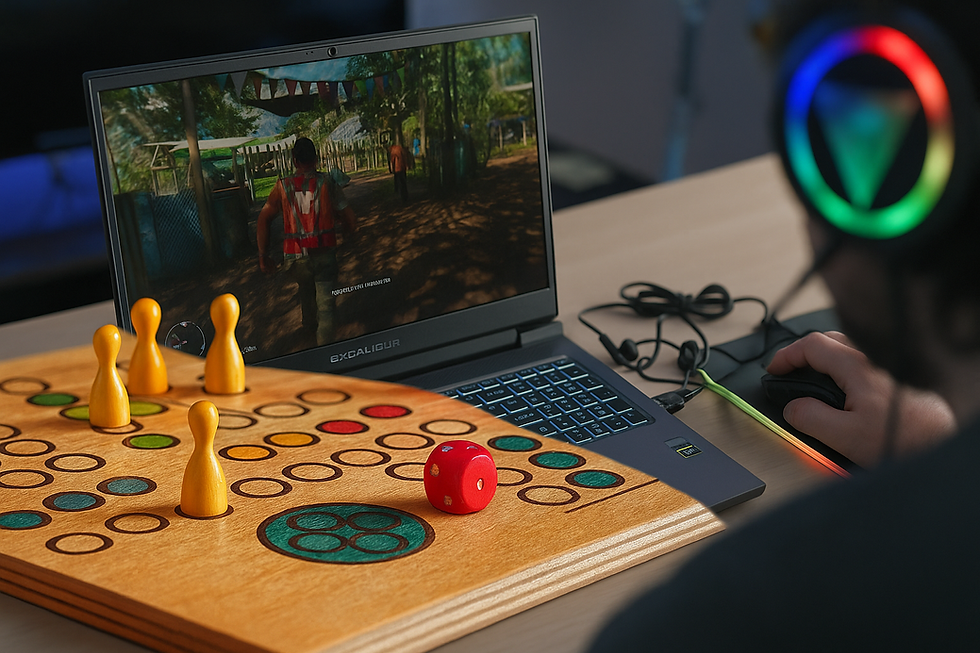Go vs Chess: Which Game Trains Your Brain Better?
- shahmeerarshad008
- Aug 20, 2025
- 3 min read
Table of Contents
Introduction
When it comes to strategy board games, two names dominate the conversation: Go and Chess. Both are centuries old, both have millions of devoted players, and both are considered benchmarks of intellectual challenge. But when it comes to the question “Which game trains your brain better?” the debate becomes fascinating.
This article dives into the history, mental benefits, and modern relevance of Go and Chess, comparing how each impacts cognitive development and brain function.
The Ancient Origins of Go
Go originated in China over 4,000 years ago, making it one of the oldest board games still played today. The game is played on a grid where two players place black and white stones, aiming to control territory.

Despite its simple rules, Go is renowned for its incredible depth, offering more possible board positions than atoms in the observable universe. This complexity demands creativity, adaptability, and long-term planning, making it a powerful tool for brain training.
The Timeless Appeal of Chess
In contrast, Chess has its roots in 6th-century India, where it evolved from a game called Chaturanga. Modern Chess, standardized in Europe, is a game of perfect information and structured strategy. With 32 pieces on a square board, players must outmaneuver their opponent to checkmate the king.

Chess is praised for sharpening analytical thinking, memory retention, and problem-solving skills, leading it to be incorporated into schools, tournaments, and even scientific studies.
Brain Benefits of Playing Go
The cognitive benefits of Go are extensive:
Pattern Recognition: Go players develop strong pattern recognition skills by memorizing shapes and predicting territory control.
Long-Term Strategic Thinking: Unlike Chess, which often emphasizes immediate tactics, Go requires players to think several moves ahead while balancing multiple regions of the board.
Creativity and Flexibility: Because no two Go games are alike, players learn to adapt and innovate.
Stress Reduction and Focus: Studies have shown that mindful games like Go encourage a meditative focus, which reduces stress and improves attention span.
Playing Go is less about memorizing openings and more about adapting to fluid situations. This makes it a fantastic brain training game for developing resilience and cognitive flexibility.
Brain Benefits of Playing Chess
Chess, on the other hand, is often called the "gymnasium of the mind" for good reason:
Memory Enhancement: Success in Chess relies heavily on remembering openings, patterns, and opponent tendencies.
Problem-Solving: Every move in Chess is essentially a problem that requires analysis and calculation.
Concentration and Focus: Chess games demand complete attention, often for hours at a time, strengthening focus and mental stamina.
Analytical Skills: Players learn to break complex problems into smaller, manageable parts — a skill transferable to academics and daily life.
Chess’s structured nature makes it one of the most studied cognitive tools in psychology and education, with proven benefits for both children and adults.
Go vs Chess: Which is Better for the Mind?
The real question is: Go vs Chess — which game trains your brain better?
Complexity: Go is more complex in terms of possible positions, making it unparalleled for developing abstract thinking and creativity.
Structure: Chess provides a structured environment that emphasizes critical analysis, problem-solving, and precise calculation.
Learning Curve: Chess is easier to learn but harder to master, while Go is simple to understand yet infinitely deep.
In truth, both games excel in different areas. Go sharpens creativity and adaptability, while Chess strengthens logic and analytical skills. Together, they provide a balanced workout for the brain.
The Role of Strategy Games in Modern Life
In today’s digital age, strategy games are more than just entertainment. They serve as mental fitness exercises, helping players reduce stress, boost memory, and enhance focus. Games like Go and Chess also build social connections, whether played online, in schools, or around a table.
This is where modern platforms come in. New innovations, such as foldable digital boards, allow people to access dozens of classic strategy games in one place. These tools combine tradition with technology, making brain training more interactive and accessible for families, students, and casual players alike.
Conclusion
The debate of Go vs Chess is less about which is superior and more about what kind of brain benefits you seek. Go develops adaptability, creativity, and spatial awareness, while Chess hones logic, problem-solving, and memory. Playing either — or better yet, both — provides a mental workout that rivals any modern brain-training app.
As strategy games continue to evolve, platforms like Pixply show how timeless classics can be reimagined for today’s world. By combining ancient wisdom with modern design, these innovations remind us that sharpening the mind can still be as fun as it was thousands of years ago.



Comments